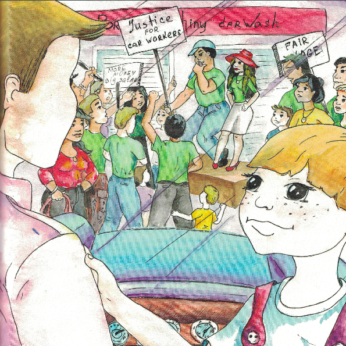
Dedicated “to carwash workers and their daily struggle for dignity and respect,” Victor Narro’s children’s book Jimmy’s Carwash Adventure, or La aventura de Jaime en el autolavado, is a loving, sensitive introduction to labor justice issues that English-speaking as well as Spanish-speaking kids can enjoy. If it falls into the right hands, even their parents and teachers can learn a thing or two as well.
Victor Narro is a nationally known expert on immigrant rights and low-wage workers, who was recently (April 28) honored by the Clean Carwash campaign at a gala awards dinner in Los Angeles. He is a project director for the UCLA Center for Labor Research and Education and a professor in the UCLA Labor and Workplace Studies minor program. Author of several book-length academic studies, he is now also the author of this children’s book that is meant to inspire empathy with working people amongst the younger generation, ages 4-10.

The text is translated into Spanish on each page by Madelin Arroyo Romero, and the charming illustrations by Yana Murashko show a racially and ethnically mixed community all pulling together to win better wages for carwash workers. It portrays the struggle as joyous in and of itself, the mass demonstration at the end being “the happiest day in Jimmy’s young life.”
The story focuses on two families who might not have become acquainted were it not for the carwash where Pedro works. On the day Jimmy’s father Howard brought his classic car in, Jimmy took along his little pedal-powered car for a wash, too. Of course it would not fit in the tracks for the road-size cars’ power wash, but Pedro hooked it up to a Jeep with a rope and treated Jimmy’s little car with adult respect.
From that moment on, the two families, and their surrounding communities, overcome their differentness, and find the connectedness they need in the fight for better treatment from the unseen but “stubborn” boss. Feminist readers might fault the story for its lack of agency, or the paucity of female characters. A name actress, Lucy LaRue, supportively stands on a box at a demonstration, but is not given a voice. “A man” instead “made a speech.”
While the book does not have a completely happy ending—if by that is meant that the struggle is victorious—a two-page addendum, “Questions for Teachers, Librarians and Parents to Discuss with Children,” also translated into Spanish, helps to get children thinking about dangerous work conditions, what purpose a union might serve, attitudes of both employers and the general public toward service workers, fairness in punishment, immigration, and other critical issues.
Surely, the next time kids witness a labor action in progress, or even what they perceive as unfair treatment on the job, they will already have had their consciousness raised.
I found one illustration that, in a lapse of continuity, has Jimmy and his pedal car on the opposite side of the street from the image on the page before, and a misspelled word on a protest poster. But if I have a major complaint, I’m sorry to say it’s about the Spanish translation, which is deficient on almost every page, including the cover—accent marks missing, misspellings, unidiomatic language, wrong genders, and sloppy punctuation. It sorely needed a proficient editor before going to print. The book’s credibility among Spanish-language parents and educators, not to mention reviewers, is at stake.
Still, despite this unfortunate distraction (which English-only readers will likely not pick up on), this is a timely, welcome contribution to the growing literature for children about labor in America.
Jimmy’s Carwash Adventure
or La aventura de Jaime en el autolavado
By Victor Narro
Illustrations by Yana Murashko
Translation by Madelin Arroyo Romero
Hardball Press, 2018
50 pages










